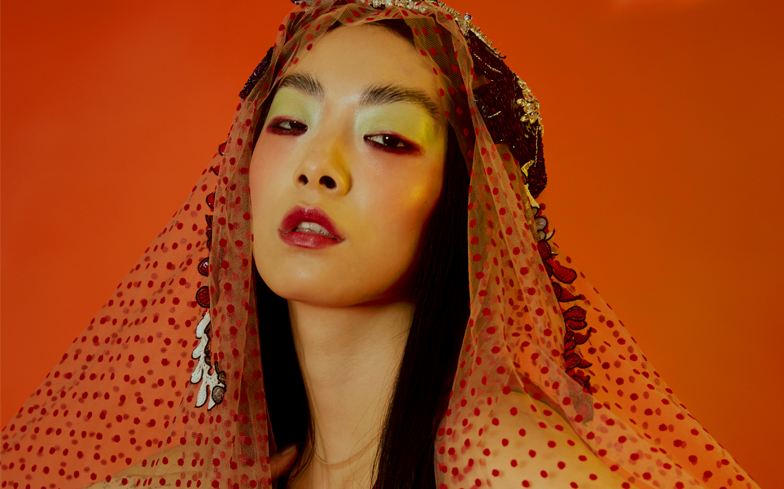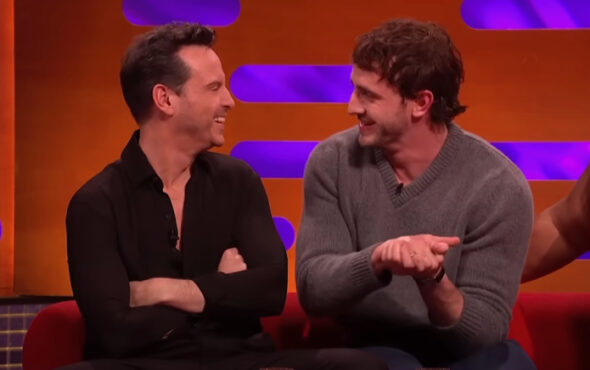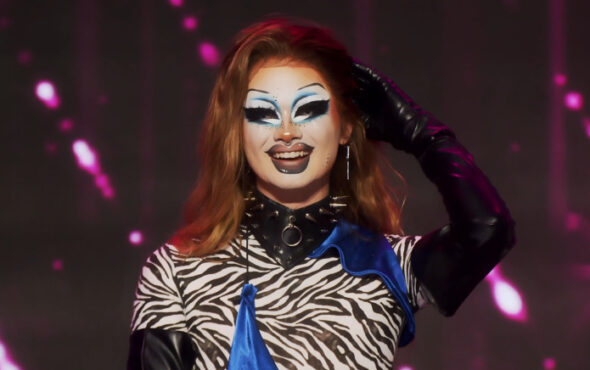
“Why do we let straight white men dictate what our music should sound like, and what we should be listening to on the radio, and what our stories should be?” a riled up voice asks down the phone.
It’s the second in-depth conversation we’ve had in a week with Rina Sawayama, one of the the most exciting new faces in pop, and she’s recalling a girls-only writing camp she attended, organised by fellow London-based artist RAYE, which offered a safe space for them to not only create, but also discuss their frustrations at the current state of the industry.
“All of these people who have been doing it for years and years have never been in a studio with more than two women. It’s insane. And then someone mentioned that Fifth Harmony’s song Work From Home was written by all men, which I just can’t deal with.”
While the faces of pop might be slowly changing for the better, offering diversity and better representation of how 21st century society actually looks, the people behind the music, writing lyrics and producing beats, are still – for the most part – straight, white and male. Rina’s answer to the problem? Just stop hiring them. “Why do we keep working with them? It’s 100% a problem, and I’m hoping that it’s gradually getting phased out,” she says with passion. “I’ve met so many old school writers, both in London and in Los Angeles, who’ve given me a vibe that I’m just not comfortable with at all, and I’ve said, ‘No, I’m not going to work with them’. I understand that when you’re with a label or a publisher it’s hard to turn down those people, but as women, and especially as queer people, we need to say no to things and be heard and stick our head above the water. It’s an issue, and I’m constantly trying to work with different people.”

Dress, £925, RYAN LO.
There’s never been a pop star quite like Rina. For an artist still working on her debut full-length album, she’s already garnered an immense level of support from both music critics and fans. She’s appeared in the pages of British Vogue and Clash, and been referred to as the next big thing by several high-profile publications (you can add Gay Times to that list, too). And as she models Tom Ford, Vivienne Westwood and Jeremy Scott in a central London photography studio with an undeniable allure, while speaking passionately about being firmly in control of her own career, it’s hard to deny her ‘future of pop’ moniker. “I love it when people say my music is the future, because I only really draw from my own experiences and thoughts and feelings,” she tells us. “I’m very involved in each part of the process. It’s very authentic.”
Subscribe to Gay Times Magazine here
While many of the most outspoken and acclaimed artists began their careers pandering to radio stations and mainstream audiences with their sound, Rina made a point to be socially-conscious from the start. Her music – which sonically ranges from sugary-sweet R&B on Cyber Stockholm Syndrome to ‘80s rock on Ordinary Superstar – rivals the biggest earworms from hitmakers Max Martin and Greg Kurstin, while also carrying strong messages of solidarity for those who feel on the outskirts of society. Flicker encourages those who’re told they have ‘unusual’ names to be proud of their heritage, while Tunnel Vision addresses the anxieties that come with the age of technology and social media. “Being independent, I was kind of forced to make smart decisions for myself from the beginning, and I knew I didn’t want to waste time doing something I wasn’t passionate about,” she recalls. “I wasn’t getting any label interest, people didn’t really understand what I was doing, so I was like, ‘I’m just gonna do it, and prove people wrong’. And now the same labels are coming back, which is quite nice.”
The parts of Rina that labels didn’t understand have since proven themselves to be the key to her success. “I’ve had a lot of producers and engineers and co-writers who really like working with me because I come to sessions and I know what I want to write about,” she says. “A lot of people will come to a session like, ‘Let’s just vibe it out’, but I always come with a message. I see artists who have suddenly realised they have a gay audience and then tailor their message to that, which is fine if they are genuinely supportive of the LGBTQ community, but I think it’s just interesting to see, from a sceptic’s perspective, what’s happening with this idea of the Pink Pound. For me, I’ll always write from my own experience, and I can’t foresee a future where I’m accepting other people’s songs to sing on my own records. I don’t want to write to appease anyone, I need to keep doing what I’m doing and push it forwards, regardless of whether that’s something a general audience will like, or a cishet audience will like. I’ve just got to do me. That’s what keeps me from going crazy.”

Heart necklace, show piece / price on request, ANDREAS KRONTHALER FOR VIVIENNE WESTWOOD, Crocoembossed leather top, £4,140, TOM FORD.
Of course, it’s not just her music that’s causing waves. Last year, to coincide with the release of her soaring pop anthem Cherry, she spoke publicly about her pansexuality for the first time, adding herself to the ever-increasing list of famous faces refusing to confine themselves to binaries like gay and straight. But while this year may have been ceremoniously dubbed #20BiTeen, discrimination against bisexual individuals is still rife, even from those within the LGBTQ community. “I guess people find bisexuality harder to identify with,” Rina muses. “Gay male culture is very strongly represented, and lesbian culture is represented too, but bisexual culture is still in a formative stage where people are still learning to own it and making it what it is.” She praises Halsey and Demi Lovato for coming out as bisexual, especially at the height of their careers, and cites Kehlani as an inspiration for singing about both male and female lovers. “I know it makes me sound really old school, but pansexual is a new word for me,” she says. “I grew up identifying as bisexual, because even maybe four or five years ago the language just wasn’t there, I don’t think. It’s such a new thing, so I’ve been getting used to my new identity.”
Subscribe to Gay Times Magazine here
With the arrival of a more open-minded and accepting generation, the tide is slowly turning against traditional labels that were once worn as badges of honour by the LGBTQ community, and queer is quickly becoming a catch-all for those who feel ‘other’. Gender stereotypes are being challenged, and straight is no longer assumed to be the default option. “I always say that I’m bisexual or pansexual, but I can definitely see a future where I just say queer,” she says. “Before, there was power in labelling yourself, it was really important to find that box for yourself, and we’ve gained so many positive things from how we’ve labelled ourselves within the community. But now, I meet a lot of people who just describe themselves as queer, and we don’t need to say anything else, which is nice because historically we’ve had to explain ourselves a lot. So I think in that sense it’s a sign of more acceptance, and the evolution of queerness, which I love. When I was growing up, queer was a negative word, so I’m glad it’s been reclaimed.”
Despite proudly discussing her sexuality in the public eye, and being out to her friends since her early 20s, Rina’s yet to have a serious conversation about the topic with her parents. Born in Japan and raised in the UK from the age of five, she’s found herself at the intersection of East and West, and the values and cultural differences that come with each of those places. “When I was growing up, I was really embarrassed about my Japanese heritage,” she says. Now, she fully embraces where she’s from in her art, and encourages others to do the same, but finding balance between her sexual orientation and her family’s sensitivities towards it has been a work in progress. “In Asian culture, especially if they live in Asia – and maybe this is an internalised biphobia thing – there’s that view of, ‘What’s the big deal? Why do I need to come out?’ So I actually haven’t had that conversation with my parents. They kind of found out through the internet,” she explains.

Embroided tulle veil, bespoke runway piece, MARY KATRANTZOU X STEPHEN JONES MILLENERY.
“You don’t really talk about anything that might lead to a conversation about sex. Which is bad, but I just accept it as a cultural difference. And at least I have a chosen family that accepts it here in my friends and people who are equally my family. [Coming out] was so important to me because it’s a big part of an internal struggle of mine, and I’m obviously proud of it, but at the same time there was this really deep feeling of shame that I wanted to put into a song. I would’ve loved to have been able to point out someone in the media who was Asian, who was bisexual, and been able to say, ‘Look mom and dad, this is someone like me, and she’s fine’. When you have Asian parents, if you’re not a doctor, or if you get a tattoo or whatever, then they think you’re going to be a drug dealer. So that was the motivation. And I don’t think I could have put Cherry out without having to explain. Other than Hayley Kiyoko, who I love, there’s just not that many Asian LGBTQ people. There’s more and more now, thank god, but I just wanted to be part of that, and to be real with myself.”
Subscribe to Gay Times Magazine here
As a queer Asian female in the music industry, Rina’s the face of a multitude of identities, which is a lot of responsibility for one person to shoulder. “I feel that I don’t know who I’m trying to represent sometimes,” she admits. “But it’s not really a pressure. I feel very invigorated by the people who send me very sweet messages. As long as I’m real and honest and true, I don’t feel pressure. I know that the reason people feel empowered is because of the music I write, at the end of the day, so I try and just focus on that, rather than trying to be an activist. My intention is to express that activism through music, and in a weird way, when you are a minority just being yourself is a form of activism, so I guess that’s what I’m doing. People have said that they’ve came out to their parents because of me, and that is just incredible. Other people say my music pulled them through a really dark period of their lives. I try and respond to everyone, it’s very sweet, and the fact that they’re able to open up to me in messages is really special.”

Dress, £925, RYAN LO.
Another issue that Rina is passionate about is cultural appropriation. It’s something that (predominantly white) people still don’t quite understand, but in 2019, have we reached a point where people can no longer claim ignorance? “It’s hard, because people are so inspired especially by Japanese culture, things like anime or whatever, and I know from friends who aren’t Japanese or Asian that it’s got them through really difficult times in their lives, and I don’t ever want to doubt genuine interest,” she reassures. “But what I think is really shit is when people take a one-sided approach to the culture, or they do it in a way where they don’t really care. You can tell. Say someone like Ariana [Grande] wants to incorporate Japanese words or get a tattoo or whatever, that’s seen as cool because they’re not Japanese. But if I came out with that aesthetic – which I do believe belongs to me, and that is what I grew up with and I have a deep relationship with – would it be groundbreaking? No. Would it be cool? No. So I was very aware of that from the beginning, that there are certain parts of my culture that have been played out by people who’re not from that culture, and it’s been really difficult to understand where I sit within that visual cultural narrative of Japan in the West. It doesn’t annoy me at all when people have a genuine interest, but you can tell when people are just using that aesthetic because their adoring fans say it’s okay. It’s not. But people make mistakes. I think Ariana took down all her Kanji stuff from her merch store, so it’s fine. I think it just takes explaining of different viewpoints.”
Rina’s debut full-length album, which is expected to drop later this year, is still in the works, but she shares that it will be executive produced by Clarence Clarity, and that she currently has around 30 solid tracks to choose from. “We’re going through all the production and trying to figure out what we want the whole album to sound like. Right now I’m really inspired by Asia and my cultural identity and my family, and trying to put that into the context of the wider world,” she says, adding that we definitely won’t be seeing any heteronormative love songs on the record. “I’m not here to write about, ‘Oh, I was in love with him’, because I think that tale has been told so many times. The story I want to hear in my songs is different.” Rina also teases her long-awaited collaboration with BloodPop, which she assures us is still coming. “It’s really subversively gay,” she says with pride. “I wrote it with Lauren Aquilina, who identifies as bisexual. I had this idea, we talked about it, and we literally wrote it on the floor of my living room. It’s really good, that’s all I can say for now.”
We finish our conversation by asking what she wants to achieve with her career. With no blueprint to follow, it’d be easy to feel overwhelmed by the challenge, but Rina’s seizing the opportunity to pave her own way. “I do have trouble imagining, because I haven’t seen an Asian pop star explode on the world stage,” she says. “But I just really believe in what I do, and I want to keep doing that, so I will.” Her end game? “World domination. Why not?”
Subscribe to Gay Times Magazine here
Photography Laura Allard-Fleischl
Words Daniel Megarry
Fashion Umar Sarwar
Hair Tomi Roppongi
Makeup Bunny Hazel Clarke
Makeup Assistant Sophie Moore
Nails Michelle Class



